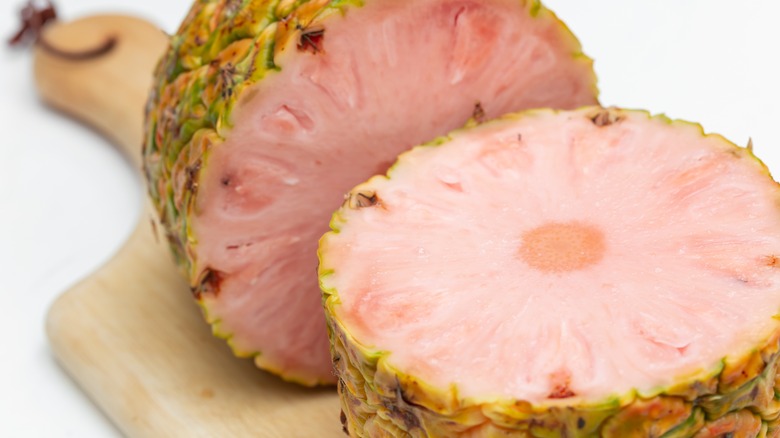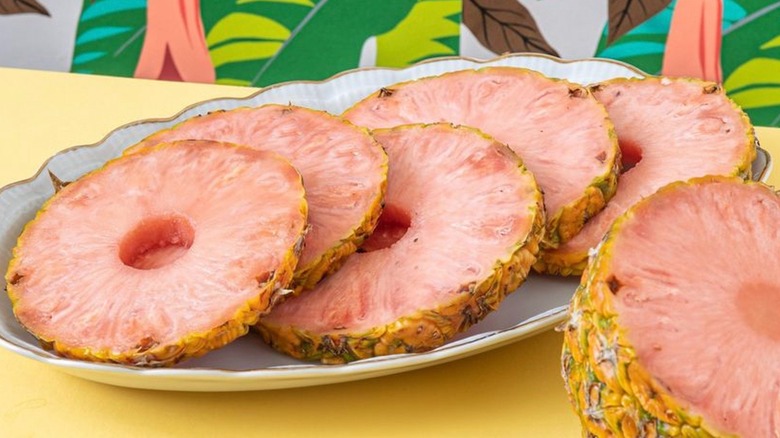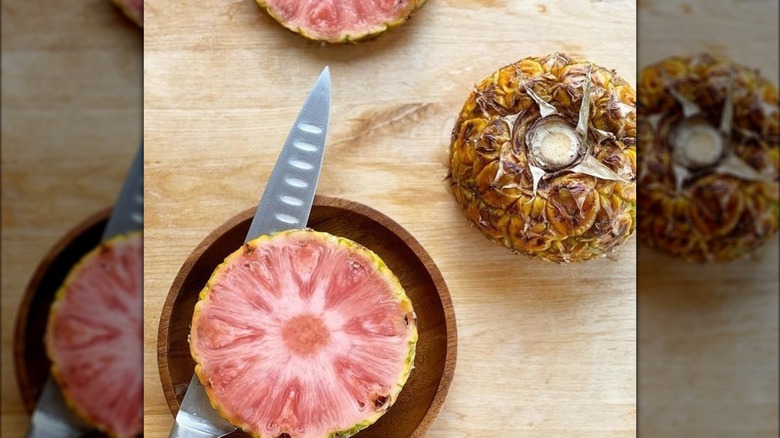Del Monte's Profits Show Consumer Appetite For Pink Pineapples
This just in: Consumers are thinking pink. Fruit giant Del Monte just released its Q2 2023 sales and judging by the numbers, the company owes a lot of thanks to one of its newer products, the most fun and playful development since cotton candy grapes. It even has its own aesthetically pleasing Instagram account.
The star of the show is the Pinkglow pineapple. What makes it so special? When you slice into the pineapple, the fruit is rosy pink. Pinkglow pineapples have been designed to create an excess of lycopene, a naturally-occurring red-hued enzyme typically found in tomatoes and watermelons. Now, fans from the tropics to Chicago are chowing down on the pastel-hued treat. Unlike some of Del Monte's more modest non-perishable-canned-fruit-in-syrup offerings, Pinkglow pineapples fetch a premium price and it looks like fans are paying it happily. Since the fruit first hit the market in 2020, sales have taken off, and now supply is struggling to keep up with demand.
Del Monte says that its Pinkglow and super-sweet Honeyglow pineapples have collectively gained the company a 26% increase in year-over-year gross profit, hitting a whopping $62 million in Q2 2023 alone, reports Food Dive. Del Monte's net annual sales hit $4.44 billion in 2022, demonstrative of a consistent increase from $4.25 billion in 2021 and $4.2 billion in 2020.
Pricey pinkies prove divisive
For now, Pinkglows are only available in the U.S. and Canada but can be purchased online via Tropical Fruit Box ($39) for East Coast foodies and via Melissa's ($29) for West Coast Foodies. That's the price per pineapple, and it's a sizable drop from their initial market price of $49, plus shipping. (But, if it helps, the single pineapple arrives in a cheerfully packaged gift box.) These high figures are surely good news for Del Monte. But, is the rosy pineapple worth the hype and the price tag? It depends on who you ask.
As its name suggests, the appeal of the Pinkglow is its hue, not so much its taste. Tasters at Pennsylvania news outlet Fox 43 said it tastes exactly like a regular pineapple but less tart. Costa Rica's Tico Times described it as slightly candy-flavored. Foodie and home cook Matt Taylor of "In the Kitchen with Matt" said the Pinkglow tastes "awesome" and floral, but might not validate the price. "If you love trying new fruits, I would give this a try," recommended Taylor, "I don't know if I would go to the website and actually order this for $30 or $40, I don't think it's worth that much. If you can find it for $10, it's probably worth trying." Also notably, the Pinkglow has the same shelf life as a regular pineapple, which could feel like a limited return on the investment.
The high price tag might be justified
As outrageous as $39 for a pineapple might at first seem, once foodies get past the sticker shock, there's a reason behind the number. Pinkglow pineapples are exclusively grown and harvested in Costa Rica's south-central tropics, as Buenos Aires de Puntarenas' warm climate and volcanic soil make it the perfect location for growing the rare pineapple. That limits growing capacity significantly, not to mention that it's been a long and winding road to get the Pinkglow from the idea board to consumer kitchens. The pineapple took 16 years of bioengineering to create, which began in 2005, and the Costa Rican government didn't give the go-ahead for Del Monte to start planting these pineapples until 2011. Even today, Pinkglows can take up to two years to grow to maturation.
On a larger scale, the rave Pinkglow sales mean that Del Monte can invest in the other bioengineering projects it has cooking (and there are a lot of them). Genetic engineering meets sustainable agriculture is perhaps an unlikely intersection, but at Del Monte, it might be the future. Last December, Fresh Del Monte unveiled a carbon-neutral pineapple. The company is setting its sights on garnering higher crop yields and making delicate produce like avocados more resistant to climate change and extreme weather conditions in the fields.


